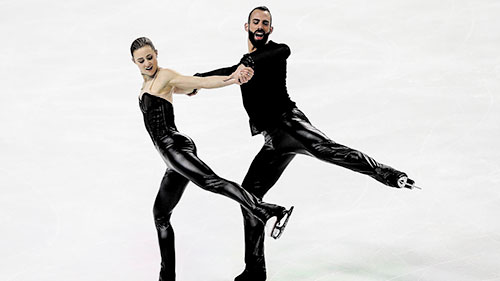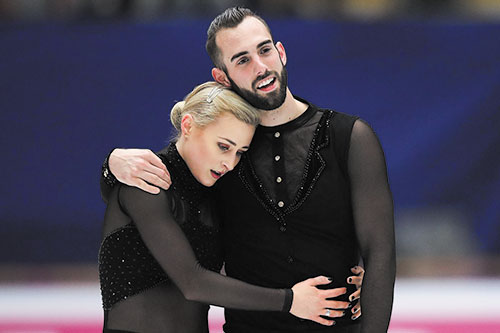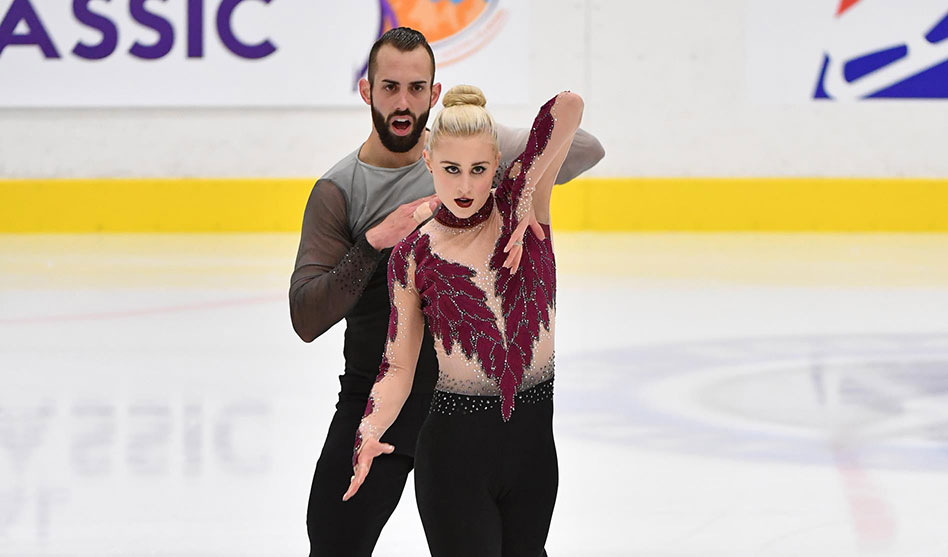Ice skating team Ashley Cain-Gribble and Timothy LeDuc set their sights on a golden season
COY COVINGTON | Contributing Writer
covingtoncoy@gmail.com
As summer turned to late summer then segued into fall, there’s been a bit of celebration for one group of people spread across the globe: It’s the beginning of figure skating season!
The smaller summer competitions got things started, then came the Junior Grand Prix and Challenger Series competitions. And now the razzle and dazzle really loops, lutzes, salchows and spins onto center ice with the 2021–22 ISU Grand Prix of Figure Skating, a series of invitational senior international competitions scheduled to run from October through December.
Skate America began the series last week in Las Vegas, and skaters earn points based on their placement at each event, with the top six in each discipline qualifying to compete at the Grand Prix Final in Osaka, Japan (where medal winners can also score some cash).
And with the Beijing 2022 Olympics lurking around the corner, the Grand Prix is especially significant this season.
 Right in the mix of it all will be our own locally-based pairs team, 2019 U.S. National Champions Ashley Cain-Gribble and Timothy LeDuc. Now in their sixth season skating together, the two are entrenched in the elite level of the sport and have high hopes and golden goals for the season.
Right in the mix of it all will be our own locally-based pairs team, 2019 U.S. National Champions Ashley Cain-Gribble and Timothy LeDuc. Now in their sixth season skating together, the two are entrenched in the elite level of the sport and have high hopes and golden goals for the season.
The team has their strategy on laser focus: medal on the grand prix and make the final, win U.S. Nationals, qualify for the Olympics and skate in the Team event and at the World Championships.
Off season training was going great guns, and they were off to a strong start — then they hit a doozy of a stumbling block. Cain-Gribble stumbled right into COVID.
The COVID battle
Though training steadily throughout the summer, Cain-Gribble developed the sniffles one day in August. By the next morning she felt much worse, with nausea, vomiting and a fainting spell, all of which all landed her hospitalized with a COVID diagnosis (although fully vaxxed) and facing a 14-day quarantine.
She was off the ice and in a state of flu, not knowing how long her recovery would take and what was next for her and LeDuc (they had already missed a competition due to quarantine). Luckily, they were added to the roster of the upcoming Autumn Classic in Montreal just two weeks later.
 The women in pairs skating are known for their strength and grit, and, although still having trouble with breathing and other COVID-related complications that worsened during the competition, Cain-Gribble stayed true to form, and, with partner LeDuc, fought through to claim the bronze medal.
The women in pairs skating are known for their strength and grit, and, although still having trouble with breathing and other COVID-related complications that worsened during the competition, Cain-Gribble stayed true to form, and, with partner LeDuc, fought through to claim the bronze medal.
Upon returning home and further testing, she was diagnosed with COVID-induced asthma and prescribed an inhaler. Then the two were immediately off to Helsinki and the Finlandia Trophy competition, where, with her trusty inhaler in tow, Cain-Gribble and LeDuc finished a strong third place (in a very deep field).
Now back at home, they are training full out.
A non-binary identity
Full out is something LeDuc can relate to. Always one to share mind and heart, LeDuc, who has been openly gay for some time, came out this summer as non-binary, their preferred pronouns being they and them.
Binary is the classification of gender into two distinct, opposite forms of masculine and feminine (man/woman). So, at its simplest, non-binary is used to describe someone whose gender identity isn’t exclusively male or female.
What does it mean to LeDuc? With a bemused chuckle they answered, ”That’s such a good question, and one I wish I could answer in a very clear way that’s easy to understand. Gender is messy and complicated, and my experience with gender is messy and complicated.
“There are parts of manhood and womanhood that I relate to, and I can express myself in typically masculine ways or typically feminine ways,” they continued. “None of them really add up to me feeling like my gender fits neatly into the social construct of the binary which is consistently re-enforced and valued.
“In being open about my identity and admitting it to the world I feel freer and more myself. I feel like I can make a much more intimate connection with the people in my life, because I’m allowing them to see me as I really am instead of seeing me with this sort of façade or mask that I’ve put on for years. I call it the ‘masc mask’ … the masculinity mask,” they said.
When asked what they would share with a well-meaning but unenlightened individual who has questions about what it means to be non-binary, LeDuc answered with their usual eloquence: “The first thing I would ask,” they replied, “is that they see me as their equal, to see me as human first and foremost. So often it’s easy for us to ‘other’ trans and non-binary people. If we don’t see them, they don’t exist,” they explained.
“I’d ask them to just see me as a person and explain that it is completely valid to live outside the binary.
“There’s an expectation that women should be elegant and demure or caretakers, and this is restrictive to women who really want to do, well, anything. The gender binary is harmful to everyone, so I would just try to remind these well-meaning people that when we, as queer people, are fighting for liberation, we’re actually fighting for everyone’s liberation. A woman may want to wear pink and be a caretaker. A man may want to have a beer and watch football with his friends, ” they continued. “There is nothing inherently wrong with those things, and we’re not discouraging them. What we’re encouraging is for people to understand that it’s not the rule. If you want to do those things, great. But you do not have to do them.”
The season ahead
This season, the team will return to the program they skated to win the U.S. Championships in 2019. The music is from the W.E. soundtrack, and, in keeping with their vision of who they are as a team, the program is themed “Two Pillars of Strength” — appropriate since they are both mentally and physically fierce.
“Since 2019, we’re both more ourselves and both so much more open with each other in our partnership,” noted Cain-Gribble. “This program is something we can go onto the ice and feel that it is authentic to us.”
“In the pairs skating you often see the stereotype of a fragile girl with a strong man coming in to save her,” agreed Leduc. “It’s a story that is told over and over, and it’s been successful. But I think Ashley and I are an alternative to that. I hope that people watching us will see that leading with authenticity, leading with what makes you different and unique is also a path to success, not someone else’s archetype of success.”
“We try to tell this story not just through the music and the story that we chose, but also with the skating style we have,” added Cain-Gribble. “We do a lot of things that show us as equals. I’m not just being lifted all the time, I’m skating just as much as Timothy, Timothy is skating just as much as me, we’re doing a lot of the same movement and we show that equality on the ice.
They’ll both need to be in perfect sync as they glide into their first Grand Prix assignment of the season, Skate Canada, which begins today (Friday, Oct. 29) in Vancouver, B.C. Although they are competing in a very loaded field, they have beaten some of those teams already this season and plan to rely on their consistent training to see them through.
They are going into this competition hoping to build on the confidence they gained with the recent success in Finland, where they skated programs that they were very proud of and that they feel are beginning to showcase everything that they know they can do.
“Skate Canada is such a great opportunity to now build on that confidence,” said LeDuc, “and put out programs that are even more reflective of everything we bring to the ice.”
Speaking of reflective. You should see their new costumes — light’s out spectacular! And they’re both wearing pants.
Skate Canada, Oct. 29 – 31. TV coverage on NBC and streaming on Peacock. Check local listings.













